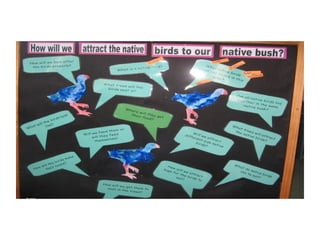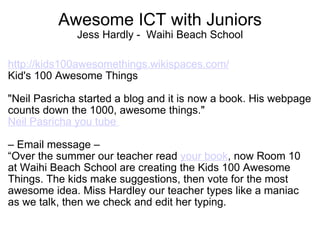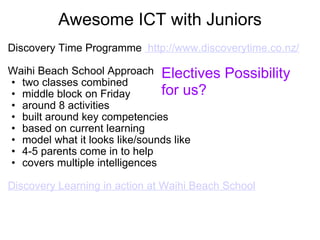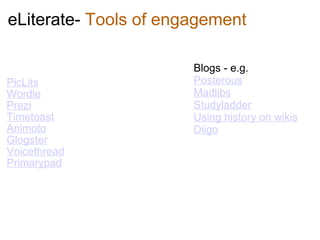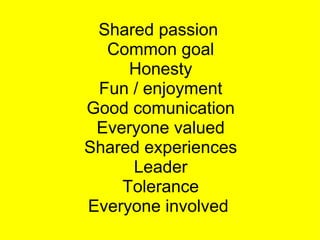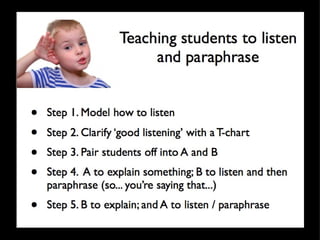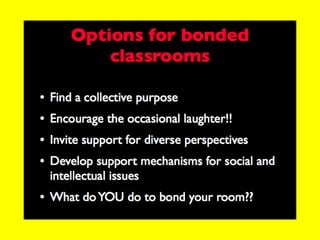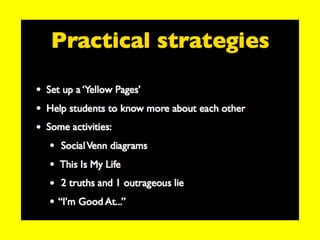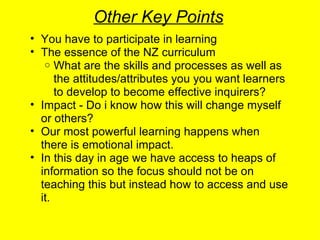U learn 11
- 2. Inquiry for Juniors Jan-Marie Kellow http://www.inquiringmind.co.nz "Wisdom begins in wonder" Socrates This breakout affirmed the things we are doing and gave ideas about how to further cater for young children and children with limited reading and writing skills. Keep it simple but ... Don't dumb it down Use authentic contexts Some inquiries can be over and done within a couple of hours or a couple of days Inquiry can be done as a series of mini inquiries , bringing all the information together at the end and making a decision In the immersion stage set up activities that will inspire them to question
- 4. ICT Resources "... technology is not the focus of the learning, but it provides an essential vehicle for getting to the destination ...The inquiry - what the student wants to learn - provides the fuel for the vehicle. Without fuel the vehicle is useless." Owens, Hester & Teale, 2002 Some good ICT resources include: http://littlebirdtales.com / - draw a picture, insert oral commentary http://www.fotobabble.com / http://voicethread.com / http://vocaroo.com / easi-speak photo booth digital camera / video www. kidrex .org - Google search for children http://www.naturalr eaders.com/index.htm
- 5. Using Classroom Environment Ongoing work on walls - include children's art Wonder wall or two - one for current topic, one for unrelated questions Synthesise bigger questions out of the little questions – more powerful putting it on the wall than doing it digitally – take photos of progress (from Julia Aiken breakout) Post-it notes with answers to questions as they come up Reliability of sources - tick post-it as a source is found. Aim for three. Use the story of Henny Penny to illustrate reliability of sources Display strategies, organisers, diagrams in use
- 8. People Resources Teacher - SCAFFOLD, SCAFFOLD, SCAFFOLD http://www.inquiringmind.co.nz/Guided_Inquiry.htm Peers - beware putting together two peers of dissimilar abilities Class discussions - teacher scribe Shared reading Older students - readers/scribes Puppet shows Drama Skype Inquiry-based learning ... provides a perfect context for the Participating and Contributing competencies.
- 9. Awesome ICT with Juniors Jess Hardly - Waihi Beach School http://kids100awesomethings.wikispaces.com/ Kid's 100 Awesome Things "Neil Pasricha started a blog and it is now a book. His webpage counts down the 1000, awesome things." Neil Pasricha you tube – Email message – “ Over the summer our teacher read your book , now Room 10 at Waihi Beach School are creating the Kids 100 Awesome Things. The kids make suggestions, then vote for the most awesome idea. Miss Hardley our teacher types like a maniac as we talk, then we check and edit her typing.
- 10. Awesome ICT with Juniors Discovery Time Programme http://www.discoverytime.co.nz/ Waihi Beach School Approach two classes combined middle block on Friday around 8 activities built around key competencies based on current learning model what it looks like/sounds like 4-5 parents come in to help covers multiple intelligences Discovery Learning in action at Waihi Beach School Electives Possibility for us?
- 11. Awesome ICT with Juniors Animations Story plan - title, plan, setting, main idea, materials Storyboard Requires a stamp of approval from teacher before executing Editing programmes: I Can Animate, iMovie, jellycam, Video Studio The Book of Rapunzel The End of the Dinosaurs http://room10waihibeachschool.wikispaces.com/Animation+Station
- 12. eLiterate: enhancing student outcomes through quality Literacy Programmes By Erin Sawyer http://ulearn11.wikispaces.com/ I personally found this breakout very interesting as I have sometimes found myself in a bit of a rut with teaching Literacy and have asked the question... IS THERE ANOTHER WAY ?
- 13. eLiterate The Journey that this presenter has been on: 1. Odd/ Even Years writing - reading a separate entity 2. Integrated Unit Based Literacy -best fit of writing genre and reading based on current unit. 3. Purpose Based Literacy Programme - a mixture of writing genres to meet purpose - reading complements writing 4. Literacy through the curriculum - what are the literacy demands required to achieve in this curriculum area? Reading/writing very closely integrated. 5. eLearning
- 14. eLiterate - Purposeful Literacy A literacy task should always have an authentic purpose. (personal needs) Literacy as a means to an end - not the end point Teaching TAPE- every time engage in a R/W task T- type (argument) A- audience ( audiences around the world eg blog) P- purpose E- effect (what kind of effect do you want to have on audience. Base your Literacy Programmes on Purpose not Genre- e.g. Don't focus on writing an argument- teach them to persuade.
- 15. eLiterate- Literacy through the curriculum This is about linking literacy to all areas of the curriculum. ASK: What are the literacy demands required. to achieve in all curriculum areas? HOW? Take all the achievement objectives and break them down. e.g. if the A.O. says students need to discuss/ explore... How will they do this, what literacy skills will they need? WHY? If you can't answer questions in Curriculum areas like Science- no matter how good you are- you will never achieve in Science.
- 16. eLiterate- eLearning Audience and purposeful contexts Blogging Learning Journals - the language of reflection Game based learning to support literacy Literacy as communication vs. the written word - importance of visual literacy and choice in communicating information Social Networks and the chat revolution
- 17. eLiterate- Game Based Learning "Live in your world, play in ours" -Playstation Myst (Tim Ryland) Civilization Sim City Samarost
- 18. eLiterate- Game Based Learning
- 19. eLiterate- ePortfolios -What literacy skills will students need to reflect on their learning? - Use the Learning Journal for Goal Setting -Students must revisit this and provide 2 pieces of evidence to show if they achieved this or not, as well as reflecting on their goals.
- 20. eLiterate- Tools of engagement PicLits Wordle Prezi Timetoast Animoto Glogster Voicethread Primarypad Blogs - e.g. Posterous Madlibs Studyladder Using history on wikis Diigo
- 21. The Team - Tony Ryan
- 22. Shared passion Common goal Honesty Fun / enjoyment Good comunication Everyone valued Shared experiences Leader Tolerance Everyone involved
- 27. Going beyond "We're doing inquiry..." Dr Julia Atkin
- 28. Why are we using an inquiry approach? Discuss with the person beside you
- 29. Student centered Relevant and meaningful Ownership of learning Deeper thinking Engaging Focus on the process of learning rather than the content How to question, reflect, form an opinion and know where to go to next. Key to more purposeful learning Skills for life long learners
- 30. Other Key Points You have to participate in learning The essence of the NZ curriculum What are the skills and processes as well as the attitudes/attributes you you want learners to develop to become effective inquirers? Impact - Do i know how this will change myself or others? Our most powerful learning happens when there is emotional impact. In this day in age we have access to heaps of information so the focus should not be on teaching this but instead how to access and use it.





